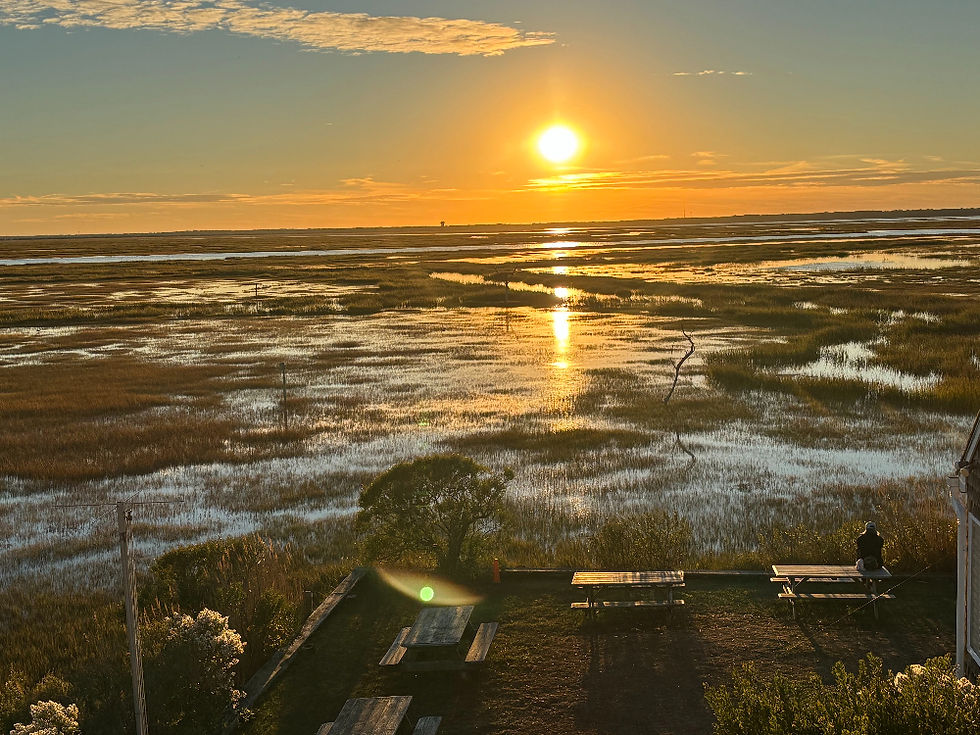Stress Down, Presence Up, Awe Real: CNIT’s Ecotherapy Study Is Now Peer-Reviewed
- CNIT

- Nov 4, 2025
- 3 min read

Quick take: A new peer-reviewed study coauthored by our founder, Dr. Heidi Schreiber-Pan, analyzed a brief, 6-week ecotherapy program delivered by licensed clinicians in a suburban park. Participants consistently reported three headline outcomes: lower stress/reactivity, stronger present-moment attention, and experiences of awe and deeper connection to nature.
Why this matters: The findings suggest nature heals through two complementary pathways:
Regulation — calming the nervous system and reducing reactivity
Meaning — cultivating awe, belonging, and reciprocity with the more-than-human world
Together, these changes support resilience that clients can feel and sustain.
What we studied
Format: 6 weekly sessions (~90 minutes) in a local park
Facilitation: Licensed clinicians trained in nature-informed therapy
Practices combined: Mindfulness/relaxation skills, Acceptance & Commitment Therapy principles, guided forest-bathing style attention practices, reflective group process, and ecopsychology-based psychoeducation
Approach: We used qualitative methods to analyze participants’ experiences across the series
What participants reported (the big three)
1) Stress & reactivity down
People described feeling calmer, more grounded, and less reactive—often noticing that “a few minutes outside” became a go-to strategy for managing anxiety and stress between sessions.
2) Present-moment attention up
Nature reliably drew attention into the here-and-now through sensory engagement (sight, sound, touch, smell). This helped participants interrupt worry loops and restore mental clarity.
3) Awe & deeper connection to nature
Many spoke about moments of awe—a felt sense of being part of something larger. That shift in perspective often came with gratitude and a desire to care for the places that care for us.
In short: skills + place + guided attention → calmer bodies, clearer minds, and experiences of meaning.
Why this is encouraging for communities
Accessible setting: Benefits emerged in a suburban park, not a remote wilderness—good news for scalability and inclusion.
Brief dose, real impact: Six weeks is short enough for busy lives and institutional pilots (employers, colleges, clinics, parks).
Whole-person change: The combination of regulation + meaning supports symptom relief and deeper motivation for healthy habits.
What this means for you
For clients & families: Nature-based sessions aren’t just “nice to have.” They can reduce stress, improve presence, and cultivate awe—skills and states you can carry into daily life.
For clinicians: The outcomes align with established frameworks (e.g., attention restoration; stress-reduction) while adding ecocentric elements (awe, reciprocity). CNIT’s trainings help you deliver both regulation and meaning in ethical, trauma-informed ways.
For employers, schools & health systems: Park-based programming can complement EAPs and wellness initiatives with measurable stress benefits and focus support. Pilot a 6-week group to enhance well-being and team resilience.
For park & community partners: Programming in ordinary parks works. We can co-design series that meet public-health goals while deepening community connection to local green spaces.
How CNIT is integrating the findings
Expanding Foundational Training and specialty modules so clinicians can replicate the protocol ethically and effectively
Growing Nature-Based Stress Reduction groups and partnerships with parks, campuses, and employers
Continuing research and inviting collaborators to strengthen the evidence base
Read the study & get involved
Plain-English summary & next steps: natureinformedtherapy.org/research
Publisher DOI (APA PsycNet): 10.1037/hum0000402 (access may require subscription)
Bring a CNIT program to your organization or park: Inquire Here
FAQs
Is the full paper open access?
The APA publisher page may require institutional access. Our Research page provides a clear summary and links. If you’re a clinician or partner who needs details for program adoption, contact us.
Do participants need to be outdoorsy?
No. Sessions are designed to be approachable, trauma-informed, and accessible in typical city and suburban parks.
Can clinicians learn this approach?
Yes—see our Foundational Nature-Informed Therapy training and ongoing mentorship options.
Can employers or parks host a 6-week series?
Absolutely. We’ll tailor the format, accessibility, and risk management to your site and audience.




In Buckshot Roulette, I keep my expression neutral even though my mind is racing. Maintaining composure becomes part of the game.